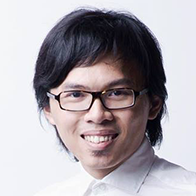We have to acknowledge inconvenient reality. There are good people in our society and there are bad people (in the broadest sense of the word). I had to confront this reality three months ago when I got involved in an accident.
 A motorcyclist hit a motorcycle, which was just right in front of me. The two victims, an old uncle and his wife, crashed onto the ground. I could not stop in time and crash into their motorcycle too. Luckily, we were all safe, although the uncle and aunty were bleeding and they suffered internal injuries.
A motorcyclist hit a motorcycle, which was just right in front of me. The two victims, an old uncle and his wife, crashed onto the ground. I could not stop in time and crash into their motorcycle too. Luckily, we were all safe, although the uncle and aunty were bleeding and they suffered internal injuries.
What really shocked me, however, was the motorcyclist who sped away. First of all, he hit the poor uncle’s motorcycle and caused them to fall off. He did not even turn around and check if they are fine. Does this person have no heart or parents?
This was not an unique accident of course. We all have read stories of hit-and-run accidents. This was not a hypothetical situation or arbitrary moral debates. People actually died. How many lives could have been saved had the culprits possess a tiny bit of conscience to make a phone call?
Another example are people who comment on social media and news portals. I have often wonder how and why people can be so nasty toward others whom they do not know.
Scroll down the comments of popular posts and news articles and you will see for yourself. It does not have to be toxic racial comments – though such things tend to happen in our country.
Recently, I recalled a Facebook user’s comment regarding Dan Slater’s commentary on the Singaporean election. Just because Slater, who is associate professor at the University of Chicago (one of the finest in the world), criticised the PAP for the authoritarian regime that it is, this Facebook user called him all kinds of name.
I clicked on his profile and saw that this was a man who has a family and probably is a fine man. Why was he so nasty towards others?
One may argue that anonymity, fake accounts and the visual distance offered by social media can explain such behaviours. But we see this nasty behaviour in the kopitiams too.
Usually, I observed that Malaysian customers are very nice towards their friends and families, but when they talk to the waiters (who are mostly foreign workers), they become very condescending.
It is almost like witnessing an exchange between the master and the slave. The slave is deemed to be lacking certain qualities and is below the master’s dignity, thus can be excluded from basic courtesy that is exclusive to “civilised people”.
Just because we pay them money does not mean that they are below us or any less a human being than us and our children.
I have to say that Malaysians are particularly nasty towards foreign workers than Americans. We like to criticise the white men for all the oppressions and brutal conquests.
But for the most part, immigrants and foreign workers are treated better in America and European countries than most of the Asian countries. Have you been inside a foreign worker’s dormitory or squatter in Malaysia and Singapore? It’s not a place for a sentient human being to live in.
My point is, nasty people exist. There are racists around us, there are abusive employers, and there are cruel assassins who abduct and kill people in broad daylight.
We have to acknowledge that. But does acknowledging the existence of evil negate the existence of the good? Does nasty people control our emotion and way of life? I do not think so.
When I accept the fact that there will always be fellow citizens who deem me as a “penumpang” or “pendatang”, I do not allow them to affect my feelings towards my country.
Their opinion that I am a lesser citizen than them does not have any bearing about what I feel about my citizenship. It is not up to any individual or group to declare that any Malaysian is less of a citizen than that of another Malaysian.
To see oneself as a Malaysian first is a personal decision. It is ultimately you who decide to remain a Malaysian at heart or not. One thing Malaysians have to be careful is to distinguish between the government and the nation, as well as between the government and political parties.
If you dislike the government, you don’t have to criticise the country at every opportunity available. If you dislike the political parties, you don’t have to condemn the entire government.
For my part, I would just laugh off any attempt to demean and diminish the status of my citizenship. I am as Malaysian as anyone else who is born and bred in this land.
We grew up here; our home and family are here. We will die and be buried in this place. Let them say whatever they want. They do not have any control or power to diminish our citizenship and our feelings for the nation.
As long as we know where our home is, nobody can take that away from us. – September 18, 2015.
* This is the personal opinion of the writer or publication and does not necessarily represent the views of The Malaysian Insider.


Comments
Please refrain from nicknames or comments of a racist, sexist, personal, vulgar or derogatory nature, or you may risk being blocked from commenting in our website. We encourage commenters to use their real names as their username. As comments are moderated, they may not appear immediately or even on the same day you posted them. We also reserve the right to delete off-topic comments